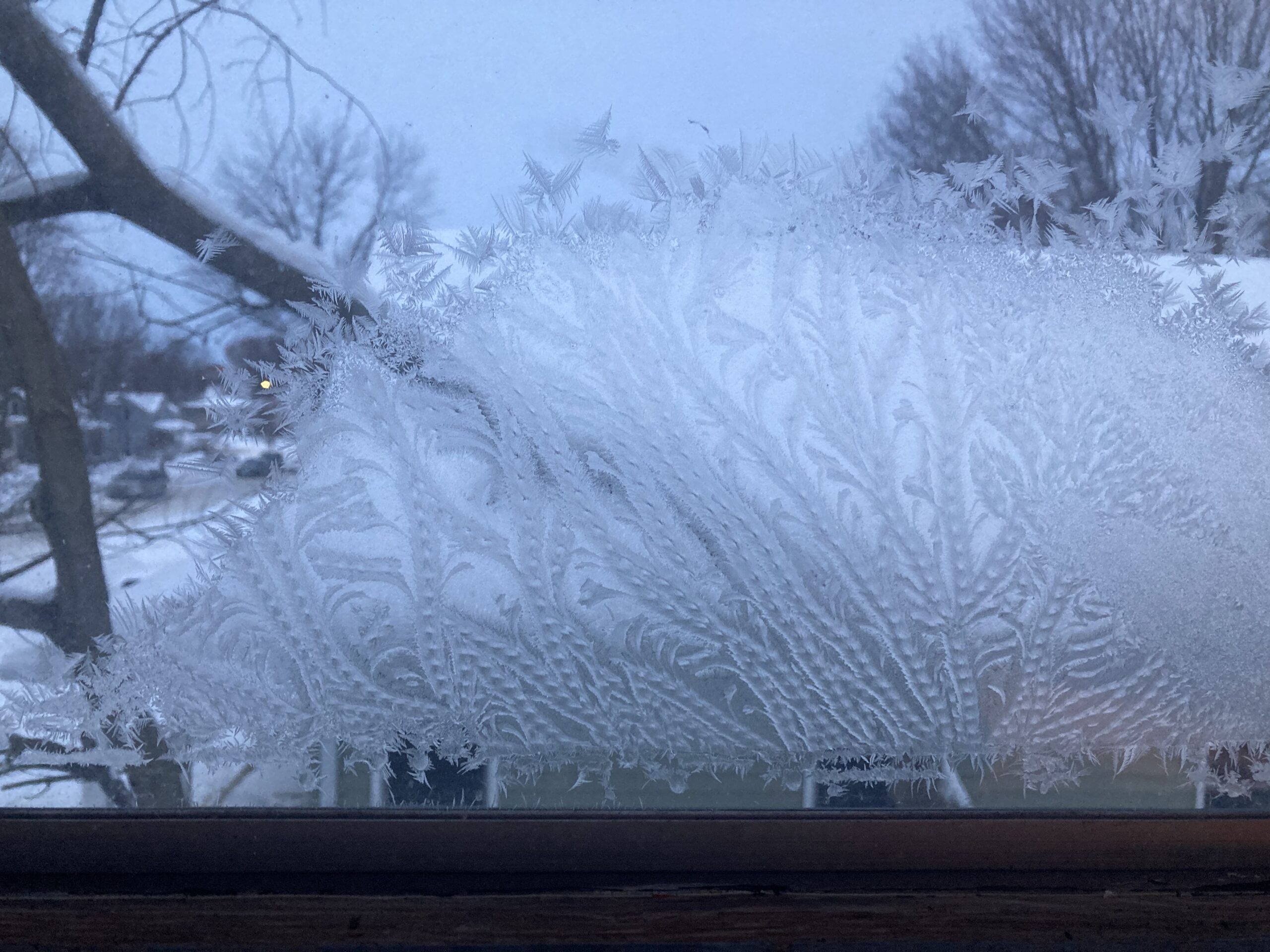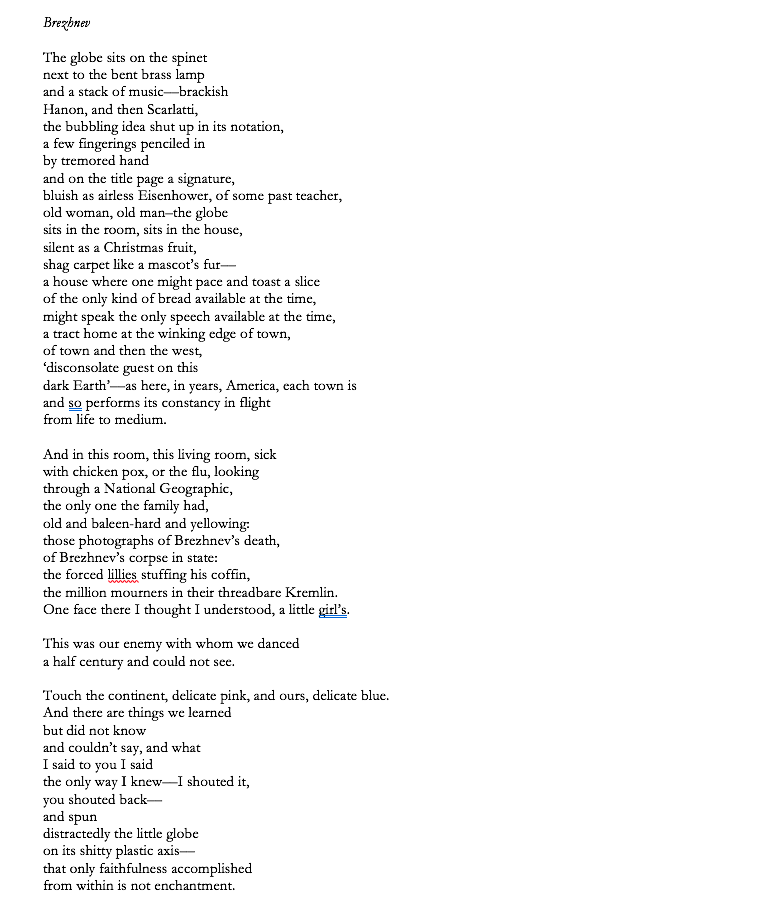
Courtesy of Timmy Straw.
For our new series Making of a Poem, we’re asking some poets to dissect the poems they’ve published in our pages. Timmy Straw’s “Brezhnev” appears in our Winter issue, no. 242.
How did this poem start for you? Was it with an image, an idea, a phrase?
There’s a scene I used to picture a lot as a little kid in the eighties: two people dancing slowly, closely, their bodies seeming to know and anticipate each other—only they are also separated by a screen, so that neither has ever seen the other’s face. This was, I think, one way I understood the world at that time: this dance (so I imagined) is what formed reality itself—Reagan’s America, Gorbachev’s Soviet Union—and the dancers’ mutually blind position was like an engine, driving the world on. This made-up scene, and my adult memory of it, was certainly a major goad to the poem. So was a weird little detail: one of my older brothers could never understand that my one-year-old self was not, in fact, a teenager like himself, and so would read to me from The Annals of Imperial Rome and the most turgid high school astronomy textbooks. Because of his mania for geopolitics, he also taught me how to say “Brezhnev”—so that, awkwardly, the Soviet general secretary’s surname was one of my first words.
How did writing the first draft feel to you? Did it come easily, or was it difficult to write? Are there hard and easy poems?
“Brezhnev” was written in late lockdown, at a point when I’d taken to swimming a lot—I had some vaguely science-y conviction that the massively elevated public-pool chlorine levels would be incompatible with covid. I liked to work out poems in the pool (in my head—no waterproof paper was involved), and the first draft of “Brezhnev” had something in it of the satisfying pull of a solid hour of the Australian crawl. It was spookily easy to write, maybe because it is largely narrative, even a little cinematic: the sense was less of pursuing a new poem, with all its hidden laws and strange hostilities, than of becoming increasingly interested in the sequence of images appearing in front of me. In fact, when the first draft was done, reading it back felt a little like looking at a VHS film on pause: the tension and blur of the vibrating image.
But yes: there are definitely poems that are quick to write and poems that can take years! I’m thinking of a poem (“The Thomas Salto”) that started in 2016 and then proceeded through probably fifteen-plus inadequate iterations over six years before arriving, last year, at something I can live with. Poems begin like migraines do, I think, and you get rid of them with similar rigor—albeit not with aspirin, quiet, and a dark room, but by writing and writing them down until they go away (hopefully into their completedness, most often into their failure!).
What were you listening to / reading / watching while you were writing this?
I was reading an essay by the Russian poet Olga Sedakova called “Mediocrity as a Social Danger.” In it, she quotes this luxuriously doomful line from Goethe, which I lifted: “You are a disconsolate guest on this dark Earth.” Sedakova’s essay is audacious, lucid, problematic, and sometimes surly. (At one point she notes, by way of a casual aside, that human will can be summarized as follows: “to ask for or refuse a drink, as on the cross.” To which I reply: Yikes! But also, minus the Christian referent: … maybe.)
I was also listening to a lot of Bach (Varvara Myagkova’s recordings of the preludes and fugues) and to Future’s “Mask Off” (the remix, with Kendrick Lamar). I like to think these songs had an effect on the poem’s form on the page, the way interstitial words like and or some are accented through the quickness and harshness of the line breaks—I was particularly wanting to get some of the bare and almost dingy beauty of the counterpoint in Bach’s Fugue in E minor from Book 1, and the skittering play of the snare against Kendrick Lamar’s verse on “Mask Off.”
What was the challenge of this particular poem?
“Brezhnev” is expressly autobiographical, which is not a kind of writing I generally do, and I find it a little scary—not for reasons of “vulnerability” but because such writing is embedded with the impossible imperative to “get it right.” By “getting it right” I mean being true to the dignity of the people—in this case, my family—whom I’ve dragged into the poem, and who know very well the place and time and circumstances of which “Brezhnev” is a (smudged) mirror. If a poem is explicitly autobiographical, then by rights it exists not only for the sake of itself but for the actual, named people in it—i.e., people whom I love and who, while “in the poem,” are also at this very moment out there on earth, doing and thinking and feeling things. All this made me nervous, and so, while the first draft came quickly, I fiddled with subsequent drafts for ages.
I also spent a lot of time sorting out its form—in writing “Brezhnev,” I had begun working in this new way, breaking the line according to a predetermined margin setting such that the emphasis lands, sometimes aggressively, on words that bear no meaning in themselves (and, the). This skews the attention, I think, toward operations and functions in the poem and away from people and things (sort of like shining a spotlight not on the actors and props but on, say, the electrical outlets on the stage floor). I also wanted the poem on the page to invoke a cat’s cradle: the kids’ game that thematizes, with great simplicity, the notion that if you tug on one thing, everything moves—a pretty good summary of Cold War geopolitics, and, I guess, of our own historical moment.
Do you have photos of different drafts of this poem?
I don’t usually keep drafts around, partly out of laziness and partly because I don’t want to look back and turn into a pillar of salt; but I do have an early draft of “Brezhnev”: you can see the three long stanzas, with a couplet overdramatically wedged in there toward the end, plus some unnecessary exposition, the first bit of which I had the wherewithal to remove. The last bit (the final six lines), however, I kept, until Chicu [Srikanth Reddy, the Review’s poetry editor] wisely suggested I redact it. I had wanted a denouement, some pleasing display of concluding truth (whatever that is); but he saw something far more interesting—the torque achieved in its refusal.

An early draft of “Brezhnev.”
from The Paris Review https://ift.tt/Uba5DvI
Comments
Post a Comment